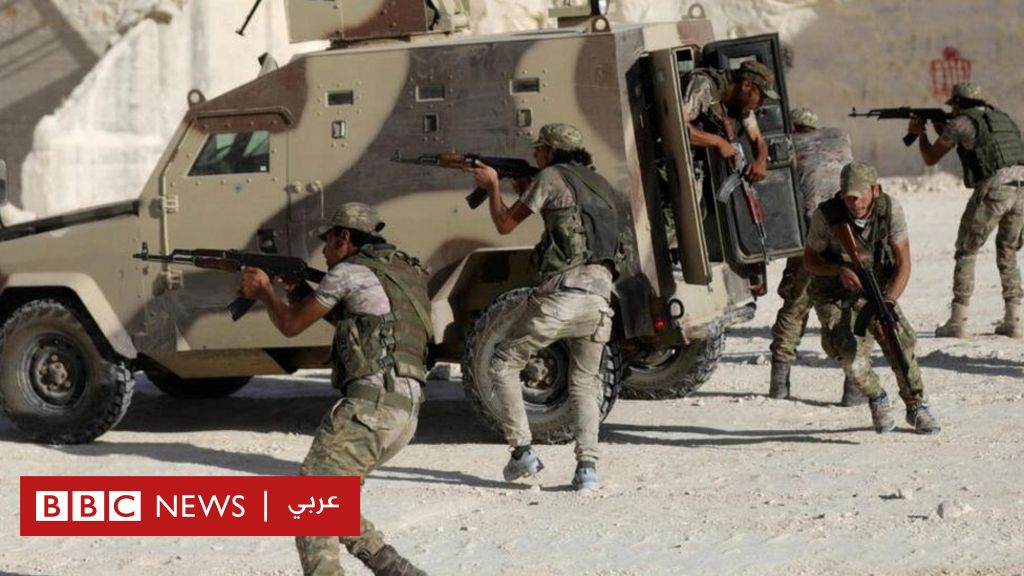The Syrian Observatory for Human Rights says that clashes took place between Syrian government forces and opposition factions in the northwest of the country affected by the devastating earthquake
The Syrian Observatory for Human Rights reported that clashes took place between government forces and opposition factions in northwestern Syria last night.
These are the first clashes between the two sides since a devastating earthquake struck the region on the sixth of February, and northwestern Syria is one of the areas most affected by the earthquake.
Northwestern Syria is under the control of armed opposition to the regime of Syrian President Bashar al-Assad in Damascus.
The Syrian Observatory for Human Rights said that Assad’s forces bombed the outskirts of the city of Atarib. And that this coincided with clashes with heavy weapons between government and opposition forces on a nearby front.
The Observatory’s director, Rami Abdel Rahman, said that 235 people from the Atarib area and its environs were killed as a result of the earthquake.
The Observatory reported that clashes took place between government and opposition forces in the city of Saraqib in northwestern Syria, and government forces bombed two villages on the outskirts of Hama.
The World Health Organization expressed concern for the population of areas in northwestern Syria, where more than four million people were already dependent on aid even before the earthquake struck.
Meanwhile, international relief agencies are redoubling their efforts to help the millions of homeless people who are sitting in tents, mosques, schools, or cars, 11 days after a devastating earthquake hit Turkey and Syria, killing more than 43,000 people.
And it was reported that two were exhumed alive from under the rubble in Turkey yesterday, Thursday, although such cases are becoming rarer, leaving despair to replace hope for their recurrence.
According to the Turkish TV channel TRT Haber, a 17-year-old girl was pulled out from under the rubble of a building in Kahramanmaraş, southern Turkey, 248 hours after the earthquake, which had a magnitude of 7.8 degrees on the Richter scale.
The earthquake claimed the lives of more than 38 thousands in southern Turkey, according to what officials said on Friday, while the authorities in Syria said that the number of deaths from the earthquake reached 5 1,800 people – a figure that has changed little in a matter of days.
And yesterday, Thursday, the United Nations said that there is a need to raise more than one billion dollars to finance relief operations in Turkey, two days after announcing the need for 400 million dollars for relief operations in Syria.
In his first televised appearance since the earthquake, Syrian President Bashar al-Assad said Thursday that the response to that disaster requires more resources than are available to his government.
Neither Turkey nor Syria has yet announced the number of missing persons due to the earthquake.
Indignation is growing among Turkish families who have lost family members over what they see as corruption in building practices revealed by the earthquake.
The Turkish authorities have pledged to hold all those suspected of being responsible for the collapse of buildings accountable, and have detained more than 100 people, including contractors and real estate developers, in this regard.
Across the border in northern Syria, the quake hit an area already divided and riven by the 12-year-old civil war.
The Syrian government says the number of deaths from the earthquake in the parts it controls has reached 1414 person.
In parts controlled by the Syrian opposition, the death toll from the earthquake has exceeded 4,000, according to reports.
But aid workers there say they have not found any survivors since February 9.
Relief efforts are being hampered by the conflict. Many in northwest Syria feel forgotten, with most of the aid going to other parts of the vast earthquake-affected areas.
Aid access through Turkey was completely cut off after the earthquake, when the crossing used by the United Nations was temporarily closed. But the Assad regime has granted approval for the use of two additional crossings.
Since the earthquake occurred until yesterday, Thursday, 119 United Nations trucks entered Syria through the Bab al-Hawa and Bab al-Salama crossings, a spokesman for the United Nations Office for the Coordination of Humanitarian Affairs told Reuters news agency.
According to the Syria Response Coordinators Organization, the earthquake displaced at least 171843 people in the northwest of the country.
The organization said in a statement on Thursday that “UN aid is still within the minimum,” noting that 93 percent of that UN aid enters Syria through the Bab al-Hawa crossing, despite the opening of two additional crossings.
The organization spoke of “general discontent in the region at the delay in the arrival of humanitarian aid from the United Nations,” noting that this aid “did not exceed 25 percent of the total aid that entered northwestern Syria.”
In its statement, the organization criticized what it said was “a major politicization of humanitarian aid, especially international aid, directed to Syria, in addition to directing a large amount of it to areas controlled by the Syrian president’s regime, which received 90 percent of the aid destined for the earthquake victims.”


